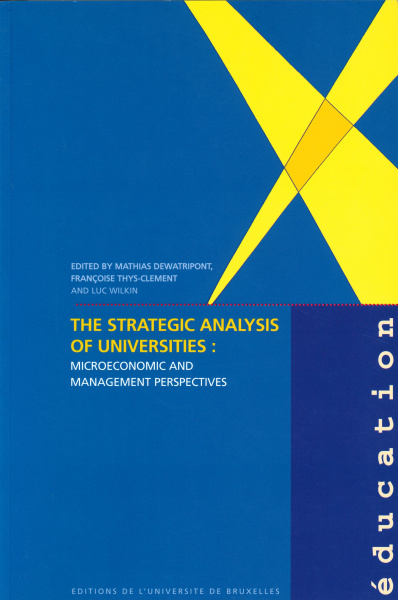The Strategic Analysis of Universities
Microeconomic and Management Perspectives
Première édition
This interdisciplinary work explores new developments in the theory of organizations and applies them to the specific case of universities. Lire la suite
Universities are central in the production and dissemination of knowledge, through their research and their training. It is thus vital for the whole process of knowledge acquisition in society to try to understand, and improve, the functioning of universities. Making progress on this front requires theoretical work as well as data collection and empirical testing. Various research questions have indeed to be addressed : First, how do universities, being non-profit institutions, come to determine their missions and their desired output mix ? Second, how do they balance the interests of their numerous "stakeholders" : students, professors, administrators, alumni, the Government and the public at large ? Third, how does the increased pressure they face for "accountability" affect their governance ? Finally, what lessons should we draw in terms of optimal university funding ?
These research questions have been at the heart of a multiuniversity project, with researchers from the Université libre de Bruxelles, the Katholieke Universiteit Leuven and the Université de Mons-Hainaut, funded by the Belgian Federal Government (under its PAI/IAP Programme). The project is interdisciplinary in nature, since it builds on academic expertise from members of the teams in microeconomic theory - in particular incentive theory, industrial economics and the theory of information-processing in organizations -, in strategic management theory, and in the economics of education. It also benefits from the practical management expertise of several team members, acquired both in academic and non-academic institutions.
This book provides a sample of research outputs from the project, with special emphasis on the strategic management of universities. It also includes a number of contributions that take a broader perspective, in order to illustrate the complementarities between the various approaches taken in the project.
Spécifications
- Éditeur
- Éditions de l'Université de Bruxelles
- Édité par
- Mathias Dewatripont, Françoise Thys-Clément, Luc Wilkin,
- Introduction de
- Mathias Dewatripont, Françoise Thys-Clément, Luc Wilkin,
- Contributions de
- Mathias Dewatripont, Françoise Thys-Clément, Luc Wilkin, Benoît Bayenet, Tom Coupé, Anne-Marie De Jonghe, Wouter Dessein, Martine Durez, Cindy Feola, Danielle Gilliot, Isabelle Hondekyn, Ian Jewitt, Patrick Legros, Andrew Newman, Bert Overlaet, Yingyi Qian, Gérard Roland, Monique Tavernier, Jean Tirole, Paul Verdin, Didier Verheve, Daniël Vloeberghs, Chenggang Xu,
- Langue
- anglais
- Catégorie (éditeur)
- > Business & Économie
- Catégorie (éditeur)
- > Psychologie & Éducation
- BISAC Subject Heading
- BUS000000 BUSINESS & ECONOMICS
- Code publique Onix
- 06 Professionnel et académique
- CLIL (Version 2013-2019 )
- 3305 SCIENCES ECONOMIQUES
- Subject Scheme Identifier Code
- Classification thématique Thema: Economie
Livre broché
- Date de publication
- 02 avril 2007
- ISBN-13
- 978-2-8004-1389-1
- Ampleur
- Nombre de pages de contenu principal : 536
- Code interne
- 1389
- Format
- 160 x 240 x 41 cm
- Poids
- 952 grammes
- ONIX XML
- Version 2.1, Version 3
Google Livres Aperçu
Sommaire
- Avant-propos
- Introduction
- PREMIÈRE PARTIE - Règles de fond
- Chapitre I - La notion d’aide
I - Présentation générale
II - Les critères de l’aide étatique
III - Le critère de l’opérateur en économie de marché
IV - La compensation d’obligations de service public
- Chapitre II - Dérogations
I - Présentation générale
II - Les aides compatibles de droit
III - Les conditions générales d’application des dérogations facultatives
IV - Les règlements d’exemption par catégorie
V - Les lignes directrices concernant les aides d’État à finalité régionale
VI - Les encadrements et lignes directrices applicables aux aides horizontales
VII - Les lignes directrices ou encadrements applicables aux aides sectorielles
- DEUXIÈME PARTIE - Règles de procédure
- Chapitre I - La procédure de contrôle des aides d’État
I - Présentation générale
II - Règles de procédure pertinentes
III - Définition des aides nouvelles et des aides existantes
IV - La procédure concernant les aides nouvelles
V - La procédure relative aux aides existantes
- Chapitre II - Les recours juridictionnels
I - Recouvrement ou suspension d’une aide illégalement accordée
II - Recours contre les décisions d’institutions communautaires ou leur
défaut d’adopter de telles décisions
III - Les recours en manquement
IV - Recours en indemnité
- Conclusion
- Bibliographie
- Index des textes d’application
- Index alphabétique des matières
- Index chronologique de la jurisprudence

